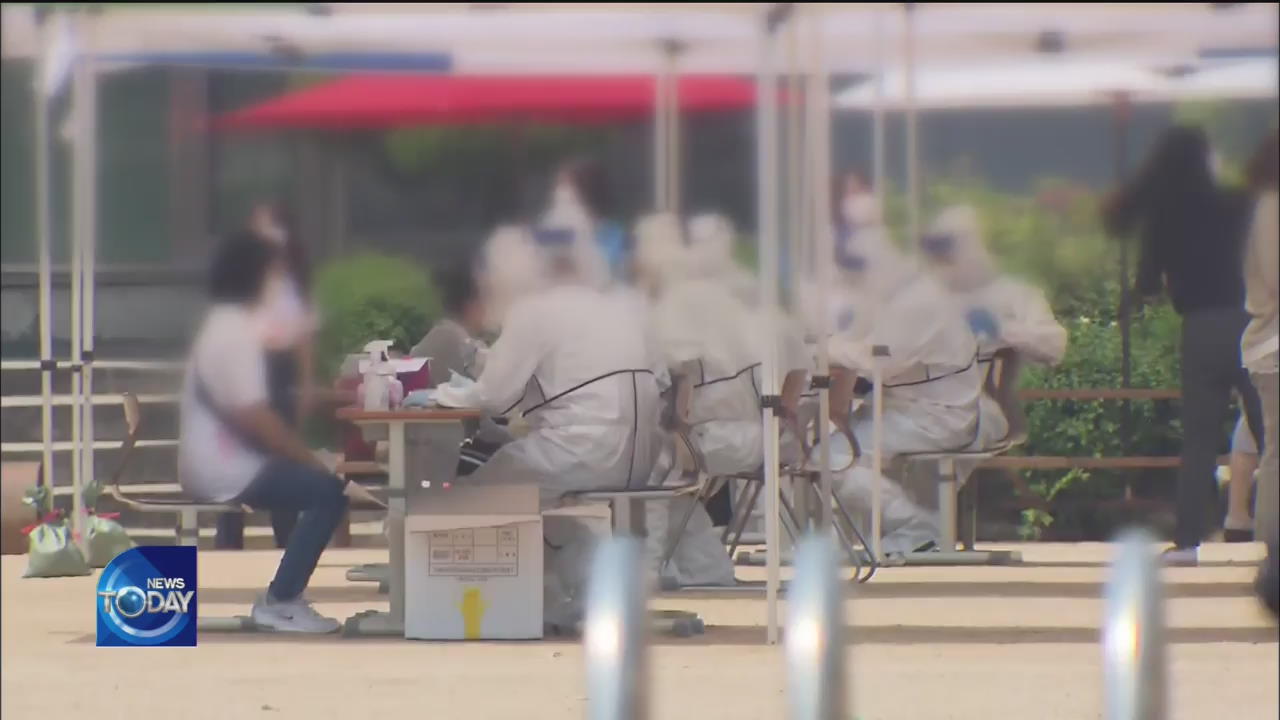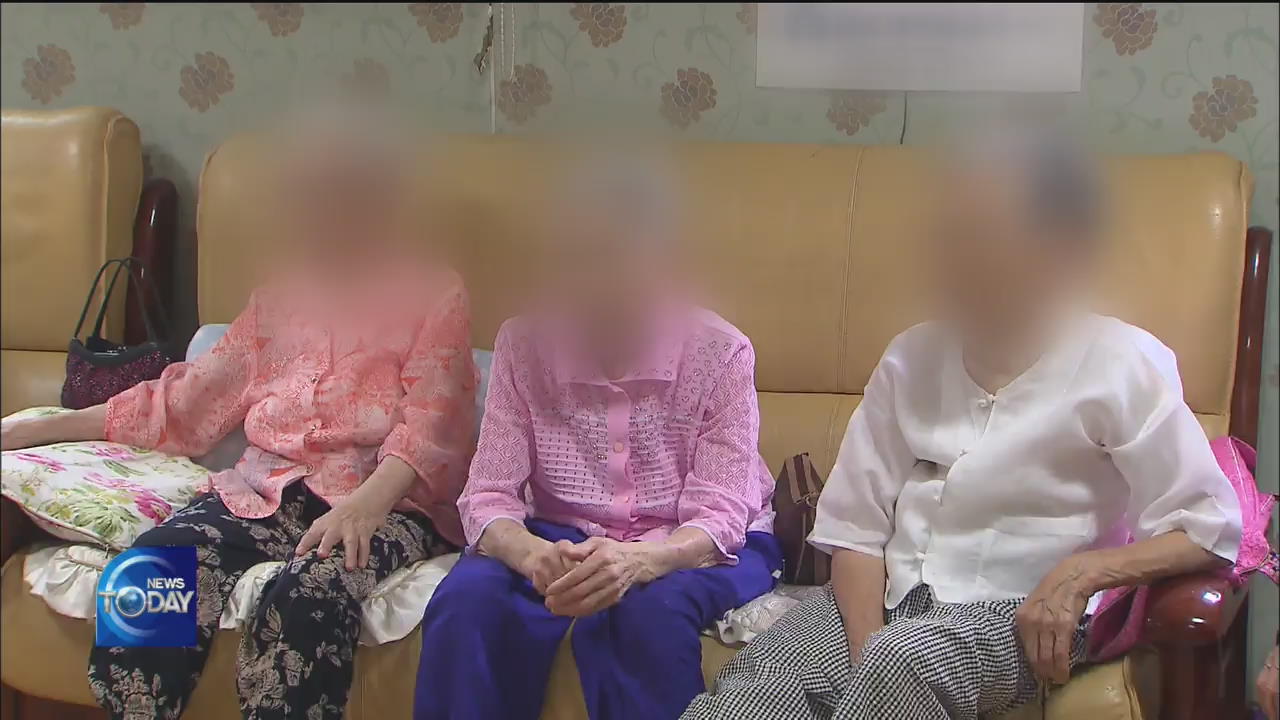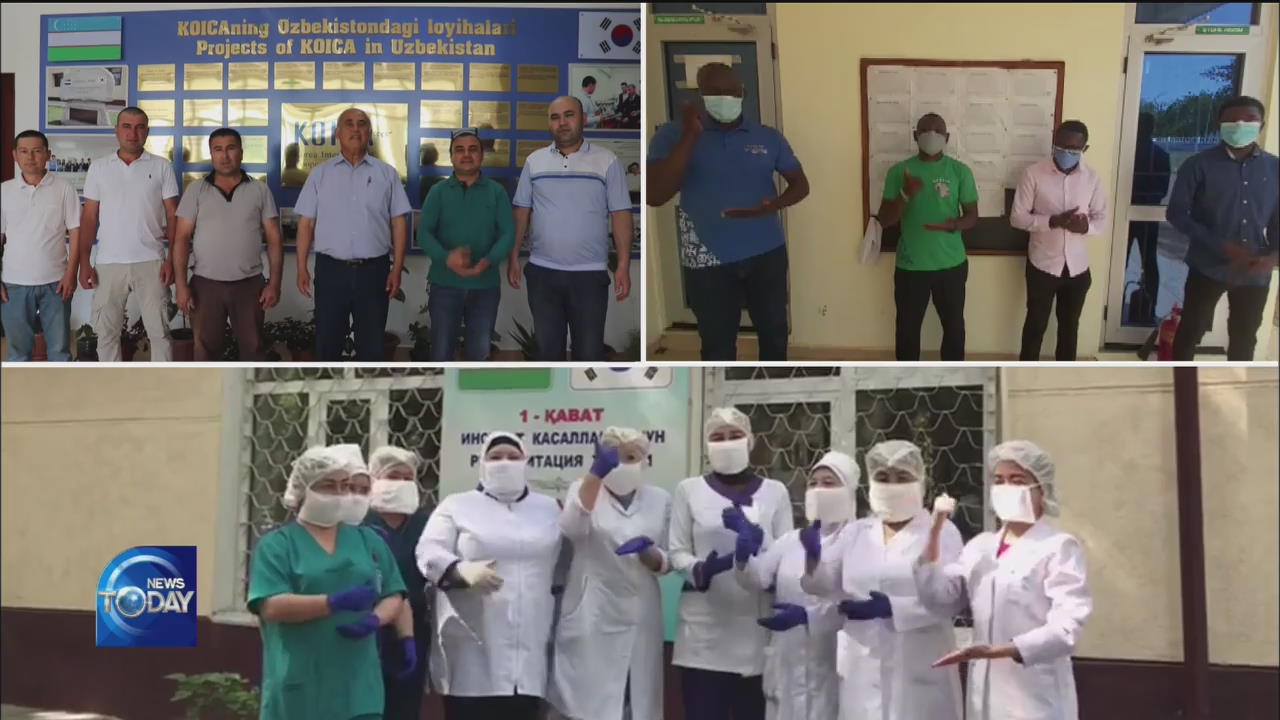WEATHER BECOMES RISK FACTOR TO HEALTH WORKERS
입력 2020.06.10 (15:18)
수정 2020.06.10 (16:45)
읽어주기 기능은 크롬기반의
브라우저에서만 사용하실 수 있습니다.
[Anchor Lead]
Daytime highs in Korea have soared above 30 degrees Celsius, and the weather has emerged as a new factor in COVID-19 testing. Three workers at a testing station in Incheon collapsed yesterday while testing students and were rushed to hospital.
[Pkg]
Rescue workers move a patient on a stretcher into an ambulance. Other patients are also transported in ambulances. Three workers at a COVID-19 testing station collapsed while conducting tests. They had been working for four straight hours under the scorching sun.
[Soundbite] CHOI NAM-OK(MICHUHOL-GU DIST. PUBLIC HEALTH CENTER, INCHEON) : "They became dehydrated working in a playground in the hot sun."
The workers' would have felt much hotter because they were wearing hazmat suits.
[Soundbite] (OFFICIAL AT PROTECTIVE SUIT MANUFACTURING COMPANY) : "Protective suits have tiny holes for ventilation. The internal temperature is probably much higher than the outside temperature. If it was 28 degrees at the time, it would have been higher than body temperature."
The workers complained of severe dizziness and headache, and were rushed to a hospital. They were lucky to have been quickly discovered by their colleagues, or else they might have been in a life-threatening situation due to heat strokes.
[Soundbite] CHO JIN-SUNG(PROF., GACHON UNIVERSITY) : "Continued exposure to the sun depletes the body of fluids and electrolytes, which eventually leads to a heat stroke."
As well as COVID-19 testing amid the continuous spread of the virus, the safety of workers at test sites in the immense heat has emerged as another critical issue.
Daytime highs in Korea have soared above 30 degrees Celsius, and the weather has emerged as a new factor in COVID-19 testing. Three workers at a testing station in Incheon collapsed yesterday while testing students and were rushed to hospital.
[Pkg]
Rescue workers move a patient on a stretcher into an ambulance. Other patients are also transported in ambulances. Three workers at a COVID-19 testing station collapsed while conducting tests. They had been working for four straight hours under the scorching sun.
[Soundbite] CHOI NAM-OK(MICHUHOL-GU DIST. PUBLIC HEALTH CENTER, INCHEON) : "They became dehydrated working in a playground in the hot sun."
The workers' would have felt much hotter because they were wearing hazmat suits.
[Soundbite] (OFFICIAL AT PROTECTIVE SUIT MANUFACTURING COMPANY) : "Protective suits have tiny holes for ventilation. The internal temperature is probably much higher than the outside temperature. If it was 28 degrees at the time, it would have been higher than body temperature."
The workers complained of severe dizziness and headache, and were rushed to a hospital. They were lucky to have been quickly discovered by their colleagues, or else they might have been in a life-threatening situation due to heat strokes.
[Soundbite] CHO JIN-SUNG(PROF., GACHON UNIVERSITY) : "Continued exposure to the sun depletes the body of fluids and electrolytes, which eventually leads to a heat stroke."
As well as COVID-19 testing amid the continuous spread of the virus, the safety of workers at test sites in the immense heat has emerged as another critical issue.
■ 제보하기
▷ 카카오톡 : 'KBS제보' 검색, 채널 추가
▷ 전화 : 02-781-1234, 4444
▷ 이메일 : kbs1234@kbs.co.kr
▷ 유튜브, 네이버, 카카오에서도 KBS뉴스를 구독해주세요!
- WEATHER BECOMES RISK FACTOR TO HEALTH WORKERS
-
- 입력 2020-06-10 15:14:27
- 수정2020-06-10 16:45:28

[Anchor Lead]
Daytime highs in Korea have soared above 30 degrees Celsius, and the weather has emerged as a new factor in COVID-19 testing. Three workers at a testing station in Incheon collapsed yesterday while testing students and were rushed to hospital.
[Pkg]
Rescue workers move a patient on a stretcher into an ambulance. Other patients are also transported in ambulances. Three workers at a COVID-19 testing station collapsed while conducting tests. They had been working for four straight hours under the scorching sun.
[Soundbite] CHOI NAM-OK(MICHUHOL-GU DIST. PUBLIC HEALTH CENTER, INCHEON) : "They became dehydrated working in a playground in the hot sun."
The workers' would have felt much hotter because they were wearing hazmat suits.
[Soundbite] (OFFICIAL AT PROTECTIVE SUIT MANUFACTURING COMPANY) : "Protective suits have tiny holes for ventilation. The internal temperature is probably much higher than the outside temperature. If it was 28 degrees at the time, it would have been higher than body temperature."
The workers complained of severe dizziness and headache, and were rushed to a hospital. They were lucky to have been quickly discovered by their colleagues, or else they might have been in a life-threatening situation due to heat strokes.
[Soundbite] CHO JIN-SUNG(PROF., GACHON UNIVERSITY) : "Continued exposure to the sun depletes the body of fluids and electrolytes, which eventually leads to a heat stroke."
As well as COVID-19 testing amid the continuous spread of the virus, the safety of workers at test sites in the immense heat has emerged as another critical issue.
Daytime highs in Korea have soared above 30 degrees Celsius, and the weather has emerged as a new factor in COVID-19 testing. Three workers at a testing station in Incheon collapsed yesterday while testing students and were rushed to hospital.
[Pkg]
Rescue workers move a patient on a stretcher into an ambulance. Other patients are also transported in ambulances. Three workers at a COVID-19 testing station collapsed while conducting tests. They had been working for four straight hours under the scorching sun.
[Soundbite] CHOI NAM-OK(MICHUHOL-GU DIST. PUBLIC HEALTH CENTER, INCHEON) : "They became dehydrated working in a playground in the hot sun."
The workers' would have felt much hotter because they were wearing hazmat suits.
[Soundbite] (OFFICIAL AT PROTECTIVE SUIT MANUFACTURING COMPANY) : "Protective suits have tiny holes for ventilation. The internal temperature is probably much higher than the outside temperature. If it was 28 degrees at the time, it would have been higher than body temperature."
The workers complained of severe dizziness and headache, and were rushed to a hospital. They were lucky to have been quickly discovered by their colleagues, or else they might have been in a life-threatening situation due to heat strokes.
[Soundbite] CHO JIN-SUNG(PROF., GACHON UNIVERSITY) : "Continued exposure to the sun depletes the body of fluids and electrolytes, which eventually leads to a heat stroke."
As well as COVID-19 testing amid the continuous spread of the virus, the safety of workers at test sites in the immense heat has emerged as another critical issue.
이 기사가 좋으셨다면
-
좋아요
0
-
응원해요
0
-
후속 원해요
0

















이 기사에 대한 의견을 남겨주세요.